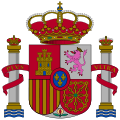- Constitutional Court of Spain
-
 The Domenico Scarlatti Building located in Madrid, seat of the Constitutional Court of Justice of Spain.
The Domenico Scarlatti Building located in Madrid, seat of the Constitutional Court of Justice of Spain.
Spain 
This article is part of the series:
Politics and government of
Spain- Constitutional Court
- Historic constitutions
- Human rights
Legislature- Cortes Generales
- Congress of Deputies
- President
- Senate
- President
- Congress of Deputies
- Opposition Leader
- People's Defender
- Court of Accounts
- General Council of the Judiciary
- Supreme Court
- Audiencia Nacional
Divisions- Autonomous
communities- Reg. governments
- Reg. legislatures
- Provinces
- Comarcas
- Municipalities
Foreign policy
The Constitutional Court of Spain (Spanish: Tribunal Constitucional de España) is the highest judicial body with the power to determine the constitutionality of acts and statutes of the Spanish Government. It is defined in Part IX (i.e. sections 159 through 165) of the Constitution of Spain, and further governed by Organic Laws 2/1979 (aka Law of the Constitutional Court of October 3, 1979),[1] 8/1984, 4/1985, 6/1988, 7/1999 and 1/2000.[2] The court is the "supreme interpreter"[2] of the Constitution, but since the court is not a part of the rest of the Spanish Judiciary,[2] for almost all other judicial matters, the Supreme Court is the highest court.[3]
Contents
Powers
The Constitutional Court is authorized to rule on the constitutionality of laws, acts, or regulations set forth by the national or the regional parliaments. It also may rule on the constitutionality of international treaties before they are ratified, if requested to do so by the government, the Congress of Deputies, or the Senate. The Constitution further declares that individual citizens may appeal to the Constitutional Court for protection against governmental acts that violate their "fundamental rights or freedoms".[1] Only individuals directly affected can make this appeal, called a recursos de amparo, and they can do this only after exhausting other judicial appeals.[4] Public officials, specifically "the President of the Government, the Defender of the People, fifty Members of Congress, fifty Senators, the Executive body of a Self-governing Community and, where applicable, its Assembly",[5] may also request that the court determine the constitutionality of a law. The General Electoral Law of June 1985 additionally allows appeals to this court in cases where electoral boards exclude candidates from the ballot.[1]
In addition, this court has the power to preview the constitutionality of texts delineating statutes of autonomy and to settle conflicts of jurisdiction between the central and the autonomous community governments, or between the governments of two or more autonomous communities. Because many of the constitutional provisions pertaining to autonomy questions are ambiguous and sometimes contradictory, this court could play a critical role in Spain's political and social development.[4]
The decisions of the Constitutional Court cannot be appealed by anyone.[1][6]
Composition
This court consists of twelve magistrates (justices) who serve for nine-year terms. Four of these are nominated by the Congress of Deputies, four by the Senate, two by the executive branch of the government, and two by the General Council of the Judiciary;[4] all are formally appointed by the King.[1] The Constitution sets a minimum standard of fifteen years of experience in fields related to jurisprudence, including "magistrates and prosecutors, university professors, public officials and lawyers,"[7] and must not contemporaneously hold a position that may detract from their independence, such as a post in a political party or a representative position.[8] Amongst and by the magistrates of the court, a President is elected for a three-year term, who is assisted by a vice-president, who is also magistrate, and a general secretary, that is the responsible for overseeing the staff of the court.[1]
Notable decisions
In 2005, the court ruled that the rest of the Spanish judicial system could handle cases concerning crimes against humanity, such as genocide, regardless of whether Spanish citizens were involved or directly affected.[9] In this instance, it reversed the decision made by the Supreme Court in the same case, which held that such cases could be brought before Spanish courts only if a Spanish victim was involved.[10]
See also
- Judiciary
- Rule of law
- Rule According to Higher Law
References
- ^ a b c d e f Newton, Michael T.; with Peter J. Donaghy (1997). Institutions of modern Spain : a political and economic guide. Cambridge University Press. ISBN 0521573483.
- ^ a b c Olga Cabrero. A Guide to the Spanish Legal System. Law Library Resource Xchange, LLC.. http://www.llrx.com/features/spain.htm.
- ^ § 123, clause 1, Spanish Constitution of 1978
- ^ a b c Solsten, Eric; Sandra W. Meditz (eds.). Spain: a country study (Second ed.). Federal Research Division, Library of Congress.
- ^ § 162, clause 1a, Spanish Constitution of 1978
- ^ § 164, clause 1, Spanish Constitution of 1978
- ^ § 159, clause 2, Spanish Constitution of 1978
- ^ § 159, clauses 4 and 5, Spanish Constitution of 1978
- ^ "Guatemalan court to rule soon on Spanish request for arrest of ex-dictator". International Herald Tribune. December 6, 2006. http://www.iht.com/articles/ap/2006/12/07/america/LA_GEN_Guatemala_Former_Dictator.php.
- ^ "Constitutional Court of Spain rules that its courts may hear genocide cases even if they do not involve Spanish citizens, and holds that principle of universal jurisdiction takes precedence over alleged national interests". International Law Update 11 (10). October 2005.
 This article incorporates public domain material from websites or documents of the Library of Congress Country Studies.
This article incorporates public domain material from websites or documents of the Library of Congress Country Studies.
External links
Categories:- Courts in Spain
- National supreme courts
- Constitutional courts
- Judicial system of Spain
Wikimedia Foundation. 2010.
